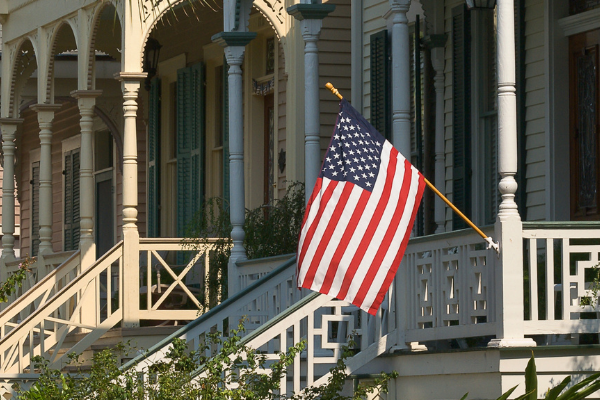Home prices during inflation can turn anyone into a skeptic when it comes to buying…
Neighbor’s Tree Fell On My Property: What Now?
“The neighbor’s tree fell on my property!”
Even if you followed our guide to protecting your home this winter, you could still find yourself making this kind of call to your insurance provider. You’ll want to know some basics about what the law says in this situation. That’s why we created this post to help you mentally prepare for what you can expect if this incident happens to you.
But first, let’s cover some similar historical incidents so you can see how past cases have been resolved.
The neighbor’s tree fell on my property: historical cases
Though they provide plenty of shade during the summer months, trees have to bear the wintry weight of heavy snow and ice. Many times limbs come crashing down, and sometimes entire trees topple and cause property damage.
Documented cases involving fallen trees that cross property lines go back into the early 1900s. Our experts have pulled together some of these and other tree-related cases throughout the years. Let’s take a look at them.
- Shiel v. Rowell (2018) – In this 2018 case, a property owner’s tree had branches that hung over their neighbor’s property, which caused damage to the neighbor’s roof. Despite this, the tree was healthy, so the case followed the ‘Massachusetts rule,’ which states that ‘an individual whose property is damaged by a neighbor’s healthy tree has no cause of action against a landowner of the property upon which the tree lies.’ In other words, the property owner was not responsible for the damage that their tree’s branches did to their neighbor’s property.
- Kurtigan v. City of Worcester (1965) – In this case, limbs were falling from a dead tree sitting on property owned by the city. Because the tree was dead and considered a private nuisance, the city was held liable for damages caused by its falling limbs.
- Jones v. Town of Great Barrington (1930) – Similar to the case above, the town of Great Barrington had let a dead and decaying tree stand for too long. The town was held liable for injuries that were suffered due to the rotted tree finally falling.
As you can see by these cases, the legal course of action can vary based on the context of each situation. In some cases, the property owner isn’t liable; in other cases, they are. You can read the laws to see exactly what they say. But we want to make it easy for you, so let’s break it down a little further.
The neighbor’s tree fell on my property, so who’s responsible?
Here are a few straightforward scenarios to help you better understand what to expect if the neighbor’s tree falls on your property.
The tree fell but damaged nothing
If the neighbor’s tree lands on your property but doesn’t deal damage to any insured property (structures like your home, shed, or fence), your policy likely won’t cover it. But just to make sure, check with your insurance agent before you start prepping your chainsaw.
The tree fell, but it’s only blocking my door or driveway
If the neighbor’s tree lands across your driveway or path to your door, it can be a major hassle just to go about your daily life. The good news here is that your policy may cover some or all of the tree removal costs. Check with your agent for clarity.
The tree landed on my car
In this situation, it’s not your homeowner’s policy that offers any coverage — it’s your auto policy. As long as you have comprehensive coverage, your auto policy will cover the cost of damages minus your deductible. Consult your auto insurance agent to make sure you’re covered.
The tree smashed my fence
In many cases, the neighbor’s fallen tree damages a fence or other detached structure. Many homeowner’s policies do cover the damages, but for a fraction of what’s covered on your home. Double-check with your insurance agent just to be on the safe side.
These incidents can be disruptive and unsettling, though now you have more clarity about what happens to clean up the mess.
But what if the neighbor’s tree falls on your house?
You can’t blame Mother Nature. That being said, you’d think your neighbor is the responsible party because it’s technically their tree, right?
Actually, it’s your insurance that’s likely to pay, and you’ll have to cover the deductible.
The point of having insurance is to stay protected against unforeseen damage and loss. A storm is something that’s beyond anybody’s control and can whip up all kinds of unpredictable damage — including toppling even the most mighty of oak trees.
If a storm brings down a tree — whether it’s from your neighbor’s property or city-owned land — your insurance will be responsible for covering the damage to your home. And if one of your trees falls onto your neighbor’s house, it’s their insurance who will have to pay, not yours.
However, if your neighbor’s tree falls and damages your property, there is one scenario in which they will be responsible for covering any losses.
What if the tree is dead or decaying?
In all the scenarios above, one big assumption is that the tree was otherwise alive and healthy. The situation changes drastically when storms or winds bring down a tree that’s diseased, decaying, and/or dead. In this case, the property owner can be held liable for damages due to negligence.
If you can prove that your neighbor was aware of the tree’s disease, decay, or death and that they failed to fix or remove the tree properly, their insurance can be held responsible for covering the expenses. This includes reimbursing you for your deductible.
In any case, it’s always a good idea to check your homeowner’s policy. When storms or heavy winds roll in, your mind can be at ease knowing that your insurance has you covered.
Need more help? MBA is here for you
MBA Mortgage is a mortgage broker, which means these tips we’ve shared with you don’t constitute legal advice. But for help answering any of your other homeownership questions, get in touch with our experts.




